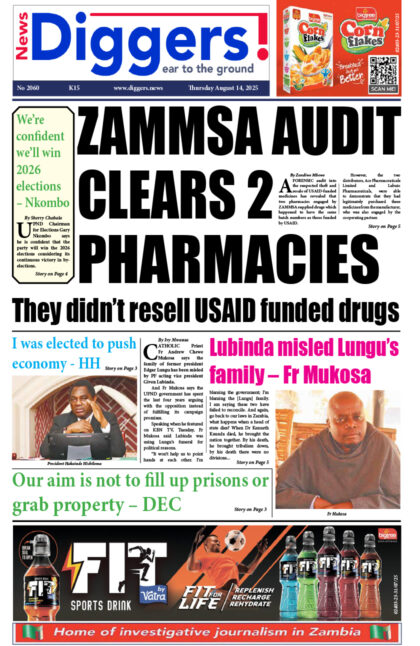The mining sector’s contribution towards Zambia’s tax revenues is insignificant and as such, it is difficult to maintain a stable fiscal policy, says Economics Association of Zambia (EAZ) president Dr Lubinda Haabazoka.
And Dr Haabazoka says the mines should stop holding government at ransom because they fail to declare corporate income tax despite receiving US $700 million in Value Added Tax (VAT) refunds, US $240 million in electricity tariffs and US $60 million in fuel subsidies.
Earlier this week, the Zambia Chamber of Mines called on government to maintain a stable mining fiscal policy for continued stability and predictability.
But ahead of the 2019 national budget, Dr Haabazoka said in a statement that government should not promote consistency of non-payment of corporate income tax because the policy favours mines.
“The Chamber of Mines has responded! They want to increase loss carry-overs from 7 to 10 years, meaning they want to extend periods of declaring loses when they know that in a fiscal year, they made profits, but declare losses on technicality. Then they demand the VAT refund arrears to be repaid. A brief history on that: VAT refund is not capital as the mines claim. VAT is normally refunded to companies to help them, reduce the cost of raw materials. The condition of VAT refund is that you need to prove that the materials you bought are for use in production. The best proof is to give receipts and show the final destination of your products. When then Finance Minister (Alexander) Chikwanda tightened procedures of VAT refunds, most of our colleagues could not show evidence of the final destination and other requirements. That is why VAT was never given to them. Up to now, some have not complied but why do they want government to give them that money? Why call a subsidy working capital? I understand that mine tax policy should be consistent. But how do we promote consistency of non-payment of corporate income tax?” Dr Haabazoka wondered.
And Dr Haabazoka, who is the director at the Graduate School of Business at UNZA, said mining companies should stop holding government at ransom.
“Mines should stop holding government at ransom. It’s a pity that every time government moves in to correct the wrong, the mines start retrenching employees. Instead of employees siding with government, they side with mines, therefore, promoting the same problems. As an individual, I get a salary, save some money, build a house, put it on rent and government without even asking my source of income will tax rentals. No consideration of whether I built the house using a loan or not. So, why should the mines bully government on taxation? The Chamber of Mines mentions that they want to increase production to one million tonnes a year. As a country, we are not interested in that amount because the more they produce; the more we lose because their contribution to government tax revenue is insignificant. How can you pay mineral royalty of 3.5 per cent and then fail to declare corporate income tax despite the fact that you receive US $700m in VAT refunds, US $240m in electricity tariffs, US $60m in fuel subsidies? It’s high time the mines came on board to help government raise resources. Government buys power from Maamba coal plant at 13 cents then sells to the mines at 6 cents when households and other companies pay 9 cents,” Dr Haabazoka explained.
“What the mines should understand is that there are other investors watching on the terraces! This includes the option of nationalising non-profit posting mines. We are alive to the fact that copper is the next gold! A conventional car now uses about 12 Kgs of copper. An electric car uses about 60 Kgs of copper cables. By 2030, the European Union will move to 100 per cent electric cars! Other developed nations are also moving in that direction. So, copper is the past, the present and the future. Zambia has enough qualified specialists to move in. We are moving in slowly to correct the situation. Mines should find a way of posting profits like their counterparts in Chile. Mining in Zambia is easier than in Chile. And by the way, at the rate we are mining, we maybe only have a decade or two of copper remaining. I am even scared when we even increase the figures to one million tonnes.”
He urged the Zambia Chamber of Mines to disclose where the US $4.8 billion raised from the sale of 800,000 metric tonnes of copper is and how it was spent.























